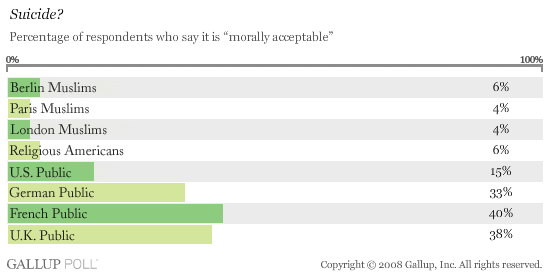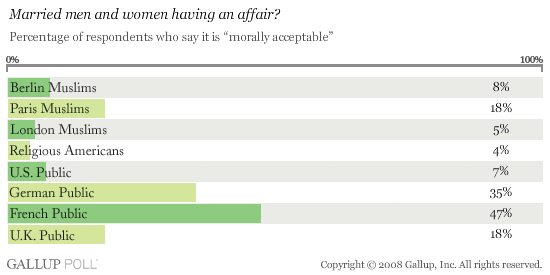This article is the second in a three-part series examining how views on moral issues compare among citizens in key Western nations and Muslims living in three European capitals. looked at the differences that exist among residents of these nations and Muslims. Part two focuses on common ground for Americans (especially those for whom religion plays an important role in their lives) and Muslims in the three cities. Part three will focus on common ground for residents in three European countries and Muslims living in their capitals.
WASHINGTON, D.C. -- ���۴�ýPoll findings reveal that on some issues Americans, especially those for whom religion is "very important" in their lives, and Muslims in three key European cities share some common moral ground.
Americans and Europeans surveyed express different opinions toward suicide. Just 15% of the U.S. public and 6% of religious Americans believe suicide is morally acceptable, compared with 40% of the French, 38% of Britons, and 33% of Germans. On this issue, Muslim respondents lean more closely toward the views of religious Americans than Europeans' views: 6% of Berlin Muslims and 4% of Paris and London Muslims say suicide is morally acceptable.
Next I'm going to read you a list. For each item on the list, please tell me whether you personally believe that it is morally acceptable or morally wrong:

Public attitudes toward the morality of extramarital affairs in the four Western countries polled show great variation. On this issue, again, Muslim views are more in line with American opinions, especially those expressed by religious Americans, than European attitudes. Forty-seven percent of the French, 35% of Germans, and 18% of Britons believe that married men and women having an affair is morally acceptable, compared with 7% of Americans and 4% of religious Americans. As a point of comparison, 18% of Muslims living in Paris, 8% of those living in Berlin, and 5% of those living in London say the same about extramarital affairs.
Next I'm going to read you a list. For each item on the list, please tell me whether you personally believe that it is morally acceptable or morally wrong:

Survey Methods
U.S. public: Results are based on telephone interviews conducted May 8-11, 2008, with 1,017 national adults aged 18 and older. Interviews are conducted with respondents on landline telephones (for respondents with a landline telephone) and cellular phones (for respondents who are cell phone only). For results based on the total sample of national adults, one can say with 95% confidence that the maximum margin of sampling error is ±3 percentage points. For results based on the 527 sample of religious Americans, one can say with 95% confidence that the maximum margin of sampling error is ±4 percentage points.
British, French, and German public: Results are based on telephone interviews conducted between December and January 2007 with at least 1,200 adults, aged 15 and older, in France, Germany, and the United Kingdom. For results based on the total sample of national adults, one can say with 95% confidence that the maximum margin of sampling error is ±3 percentage points.
Muslim populations in Paris, Berlin, and London: Results are based on face-to-face interviews conducted between November and December 2006 with at least 500 adults, aged 15 and older, in Paris and London. In London and Paris, a probability sample of neighborhoods where Muslim penetration was at least 5% was used. In Berlin, results are based on telephone interviews conducted between January and February 2007 with at least 500 adults aged 15 and older. Also, in Berlin, random-digit dialing was used (dialing of first and family names with a high probability of leading to a Muslim household). For results based on the total sample of adults in each city, one can say with 95% confidence that the maximum margin of sampling error is ±5 percentage points.